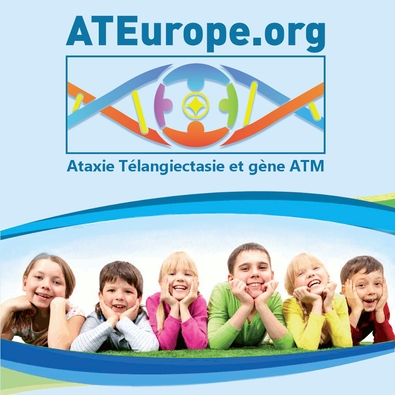
PROGRAM "OVERCOMING ATAXIA TELANGIECTASIA"
2020 CALL FOR RESEARCH PROPOSALS
ATEurope launches its third call for research proposals on ataxia telangiectasia
ATEurope is an endowment fund created in May 2010 aiming to:
- promote research on ataxia telangiectasia (AT) and thus contribute to the treatment of the disease,
- inform the public and the families about the disease in order to avoid misdiagnosis and contribute to the support of affected children and their parents.
ATEurope is launching its third call for research projects. If the ultimate goal of ATEurope research projects is to identify new therapeutic approaches for the disease, the research can cover the following areas:
- clinical and biological knowledge of the disease
- understanding of immune and neurological involvement or tumor risk
- creation of model systems for the development of innovative treatments (special attention will be given to animal and cell models)
AMOUNT OF GRANT
The chosen teams will receive support for a maximum of 36 months. The total funding per project could reach 200,000€. The grant can cover equipment, consumables, travel expenses or staff.
In the case of staff recruitment this must occur within 6 months following the start of the project.
The budget request will be considered as part of the evaluation process and there will be no possibility to change the total sum requested significantly after the selection of the project by the Scientific Advisory Board. However, some flexibility in the use of the funds may be authorized after consultation with the Scientific Advisory Board.
SELECTION CRITERIA
The project leader
The applicant must be:
- MD and/or PhD, attached to a research structure
- in charge of the team that will carry out the project
Project:
- The project must be innovative with preliminary results to support the working hypothesis
- It should have potential applications in the areas mentioned above
- It may be a fundamental, translational or clinical research project
Selection criteria:
- Relevance and originality of the project
- Clarity of objectives and methodolog
- Feasibility: work environment, calendar
- Expected impact (scientific and medical) and potential therapeutic applications
- Positioning of project in the national and international context
- Quality of previous work of the applicant and his team
- Appropriate budget for team’s needs
The application (maximum 3 pages, Times New Roman, 12pt, line spacing 1.15) should be accompanied by a short cv of the project leader with a list of 5 publications relevant to the application.
In the case of a collaborative project involving more than one team the cv and publication list of all team leaders should be provided.
TEAM’S COMMITMENTS TOWARDS ATEUROPE
The teams must submit at the end of each year a scientific report stating its progress and a final report at the end of the contract period.
The teams must also commit themselves to:
- participating in communication activities in order to publicize the support provided by ATEurope
- clearly showing their partnership with ATEurope in their laboratories as well as in their publications and presentations of their work
SELECTION PROCEDURES
The selection will be carried out by the Scientific Advisory Board.
Applications from outside France will be considered. However, French based projects will be prioritized for funding.
SCIENTIFIC ADVISORY BOARD
The Scientific Advisory Board of ATEurope is composed of:
- Pr. Dominique Stoppa-Lyonnet, chairwoman, Institut Curie, Université de Paris
- Pr. Alain Fischer, Institut Imagine, Collège de France
- Pr. Alexandra Durr, Institut du Cerveau et de la Moelle, Université Sorbonne
- Pr. Jacques-Olivier Bay, CHU Clermont-Ferrand, Université Blaise Pascal
- Pr. Vincent Laugel, CHU Strabourg, Université de Strasbourg
- Dr. Janet Hall, INSERM
- Dr. Nancy Uhrhammer, Centre Jean Perrin
- Dr. Fekrije Selimi, Collège de France
- Dr. Nizar Mahlaoui, Hôpital Necker-Enfants Malades, CEREDIH, Institut Imagine
CALENDAR
January 1st, 2020: Opening of the call for proposals and access to application forms on the website: ateurope.org
April 1st, 2020: Closure of the call for proposals
May 2020: Selection of projects

